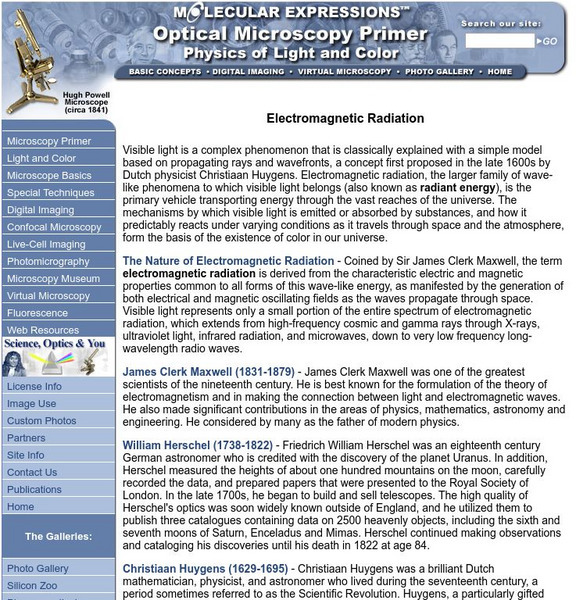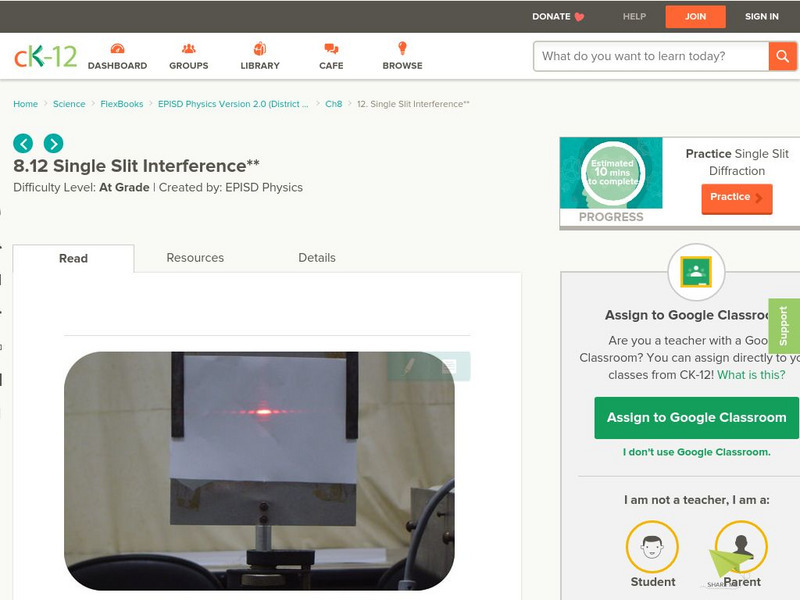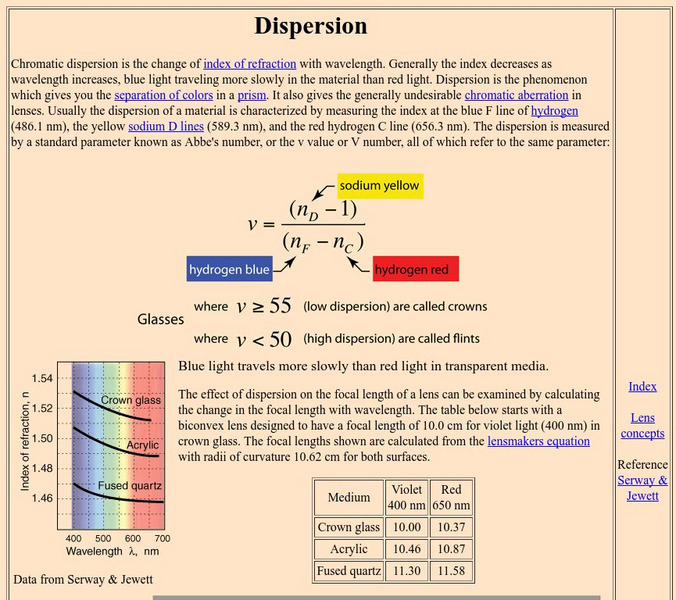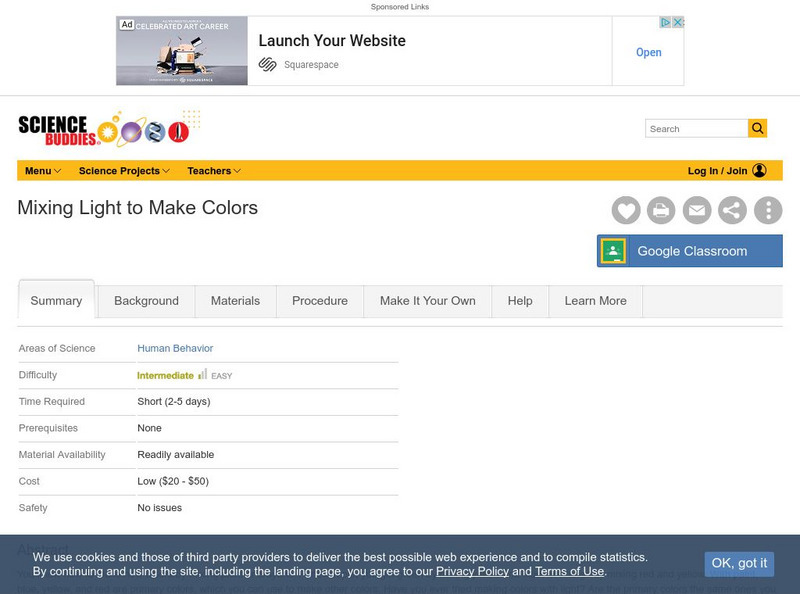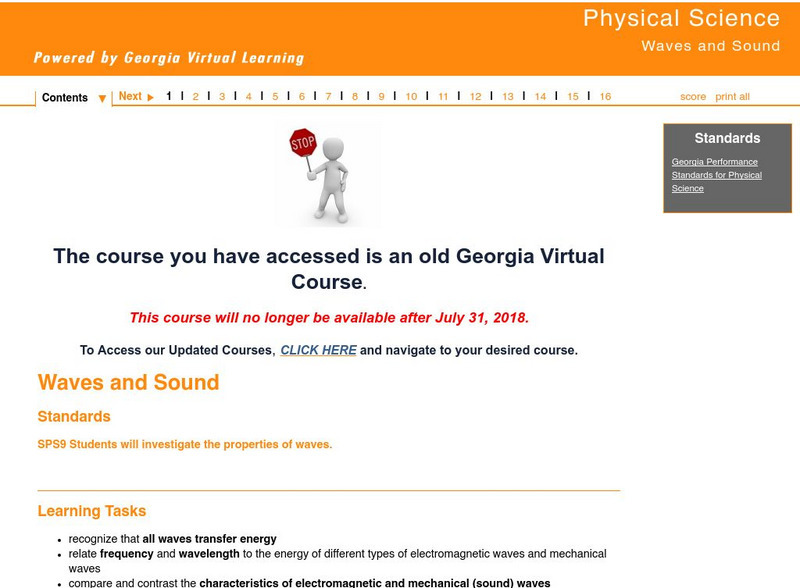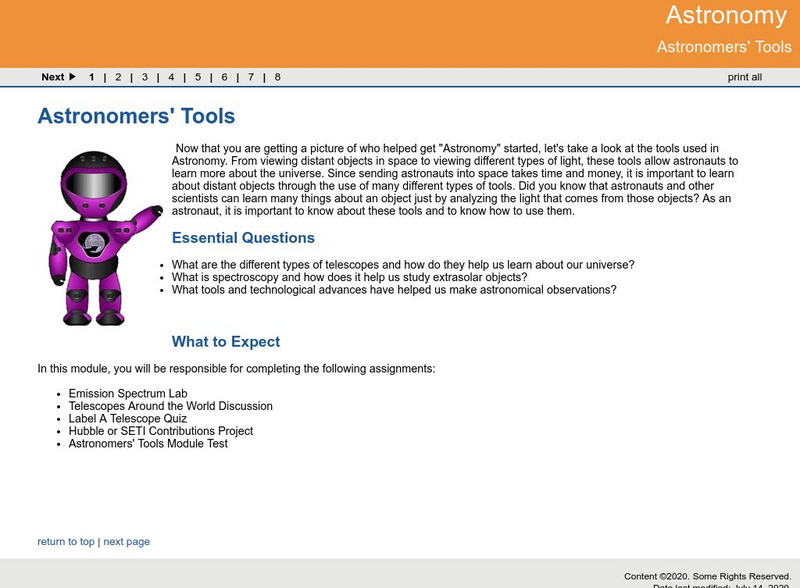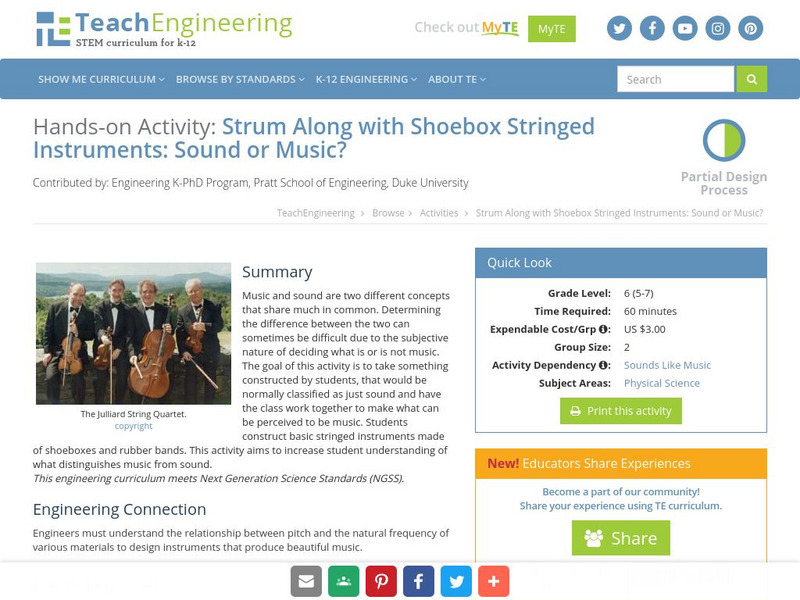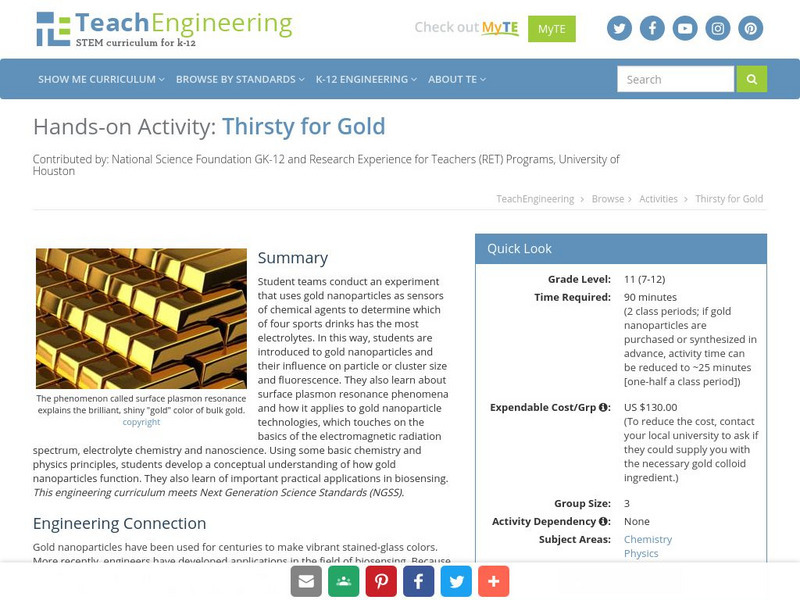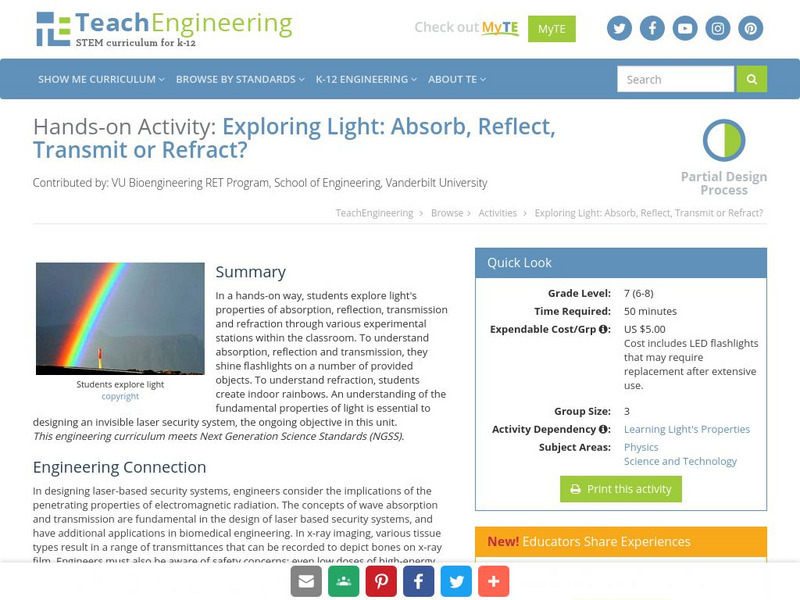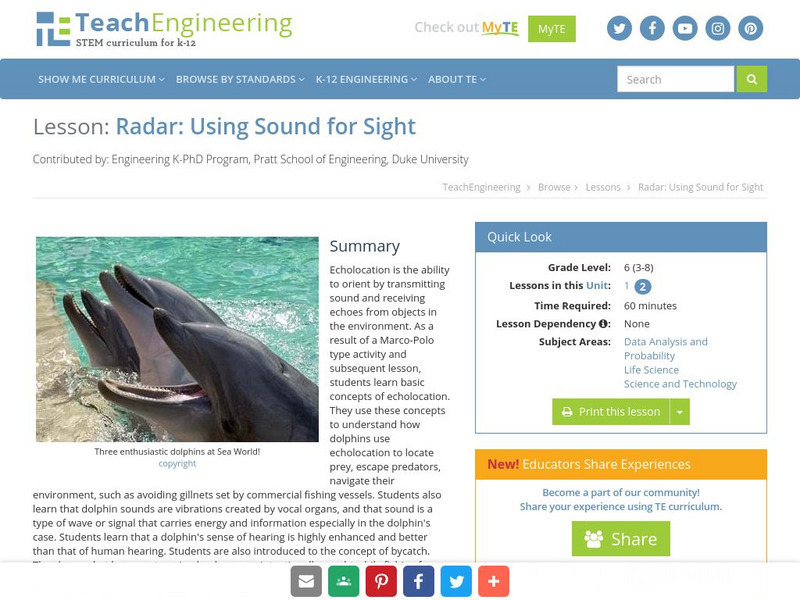Dartmouth College
Dartmouth College: Chem Lab: Scanning Spectrometer
The scanning spectrometer measures absorbance vs. wavelength for liquid samples. Directions on how to use this instrument are provided here.
Libre Text
Libre Texts: Physics: Electromagnetic Waves
Utilize this wiki-type page created by students and faculty members to gain a higher understanding of the electromagnetic waves. Study the equations to comprehend how different variables can affect characteristics of wavelengths.
Florida State University
Florida State University: Molecular Expressions: Electromagnetic Radiation
This Florida State University page introduces light as an electromagnetic wave and discusses the frequency and wavelength range of the various regions of the electromagnetic spectrum. Includes links to some interactive Java applets.
NASA
Nasa: Electromagnetic Spectrum: Radio Waves
Radio waves have the longest wavelengths in the electromagnetic spectrum. This NASA article discusses AM, FM, TV, cell phone, as well as radio astronomy, which all use this technology.
Science Struck
Science Struck: Electromagnetic Waves: Origin and Theory
Discusses the history of the discovery and study of electromagnetism, the scientists who worked on it, the basic principle, how wavelength and frequency are related, and types of electromagnetic waves.
Physics Aviary
Physics Aviary: Doppler Lab
This lab is designed to have students investigate the changes to wavelength and frequency that occur when the source of the waves is in motion. This video describes the lab: https://youtu.be/eCceYPBR6f4
Science Struck
Science Struck: Working of an Infrared Thermometer
Learn how an infrared thermometer works and what each of its parts does. A chart lists the different applications of infrared thermometers by the wavelength each emits.
Famous Scientists
Famous Scientists: Wilhelm Rontgen
A short biography about the scientist who produced and detected electromagnetic radiation in a wavelength range known as X-rays or Rontgen rays, which earned him the first Nobel Prize in Physics in 1901.
CK-12 Foundation
Ck 12: Plix: Energy Levels: Bohr's Atomic Model
[Free Registration/Login Required] In this interactive you will excite an electron by dragging it into a higher orbital and use the table to see what wavelength of electromagnetic radiation is emitted when it returns to its lowest orbit....
CK-12 Foundation
Ck 12: Single Slit Interference
[Free Registration/Login may be required to access all resource tools.] Explains what causes single slit interference of light and how to find the wavelength of a single slit interference pattern using a formula.
CK-12 Foundation
Ck 12: Double Slit Interference
[Free Registration/Login may be required to access all resource tools.] Explains the terms diffraction, interference, and interference patterns. Describes the double slit experiment and how to determine the wavelength of a double slit...
Khan Academy
Khan Academy: Characteristics of Longitudinal and Transverse Waves
Test yourself on the topics of identifying the characteristics of a longitudinal or transverse wave such as the wavelength, crest, and areas of compression with this multiple choice quiz.
Khan Academy
Khan Academy: The Quantum Mechanical Model of the Atom
Introduction to the quantum mechanical model of the atom: Thinking about electrons as probabilistic matter waves using the de Broglie wavelength, the Schrodinger equation, and the Heisenberg uncertainty principle. Electron spin and the...
Georgia State University
Georgia State University: Hyper Physics: Dispersion
The phenomenon of light dispersion is explained with a formula and a practice form for calculating Abbe's number.
Science Buddies
Science Buddies: Mixing Light to Make Colors
You know how to make new colors by mixing paint or crayons. For example, you get green by mixing yellow and blue, or orange by mixing red and yellow. With paint, blue, yellow, and red are primary colors, which you can use to make other...
University of Colorado
University of Colorado: Physics 2000: More About Visualizing Electromagnetic Waves
Discusses the nature of an electromagnetic wave. Explains the oscillating electric field and represents it through clever graphics and animations.
University of Colorado
University of Colorado: Physics 2000: Cat Scans: Projecting Shadows
This page and the three pages which follow discuss how X-ray technology can be used to produce an image of the human body. Discussion is understandable and highly intriguing. Several interactive animations allow the visitor to explore...
CK-12 Foundation
Ck 12: Electromagnetic Waves
[Free Registration/Login may be required to access all resource tools.] In this learning module, compare characteristics and behaviors of transverse waves, including electromagnetic waves.
Georgia Department of Education
Ga Virtual Learning: Physical Science: Waves and Sound
In this module, students investigate the properties and behavior of different types of waves.
Georgia Department of Education
Ga Virtual Learning: Astronomers' Tools
In this interactive tutorial students will learn about a few of the instruments used to further our knowledge of the Universe around us.
TeachEngineering
Teach Engineering: Strum Along
Music and sound are two different concepts that share much in common. Determining the difference between the two can sometimes be difficult due to the subjective nature of deciding what is or is not music. The goal of this activity is to...
TeachEngineering
Teach Engineering: Thirsty for Gold
Student teams conduct an experiment that uses gold nanoparticles as sensors of chemical agents to determine which of four sports drinks has the most electrolytes. In this way, students are introduced to gold nanoparticles and their...
TeachEngineering
Teach Engineering: Exploring Light: Absorb, Reflect, Transmit or Refract?
In a hands-on way, students explore light's properties of absorption, reflection, transmission and refraction through various experimental stations within the classroom. To understand absorption, reflection and transmission, they shine...
TeachEngineering
Teach Engineering: Sound for Sight
Echolocation is the ability to orient by transmitting sound and receiving echoes from objects in the environment. As a result of a Marco-Polo type activity and subsequent lesson, students learn basic concepts of echolocation. They use...
Other popular searches
- Wavelength and Frequency
- Calculation Wavelength
- Frequency Wavelength
- Wavelengths of Light
- Differing Wavelengths
- Wavelength Diagram
- Wave and Wavelength
- Calculation of Wavelength
- Power Point Wavelength
- Short Wavelength
- Long Wavelength
- Wavelengths Absorbance


